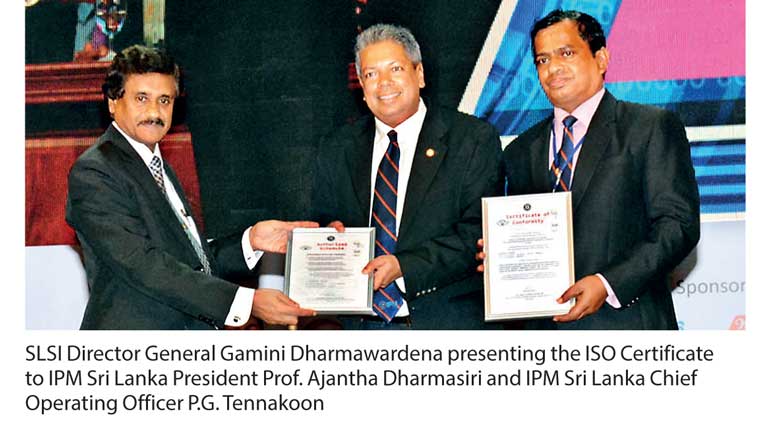Tuesday Feb 17, 2026
Tuesday Feb 17, 2026
Wednesday, 5 July 2017 00:00 - - {{hitsCtrl.values.hits}}
 IPM Sri Lanka, the nation’s leader in HRM, was awarded the prestigious ISO 9001:2015 Quality Management System Certificate covering all its operations including branch operations in Galle, Kurunegala and Kandy.
IPM Sri Lanka, the nation’s leader in HRM, was awarded the prestigious ISO 9001:2015 Quality Management System Certificate covering all its operations including branch operations in Galle, Kurunegala and Kandy.
The certificate was presented to IPM Sri Lanka President Prof. Ajantha Dharmasiri and IPM Sri Lanka Chief Operating Officer P. G. Tennakoon by Sri Lanka Standards Institute (SLSI) Director General Gamini Dharmawardena at the recently concluded IPM National HR Conference 2017 held at the BMICH in Colombo.
“We are delighted with the ISO quality certification that we received. It symbolises our continuing commitment to quality across all of our operations. We are thankful to the Sri Lanka Standards Institute for the guidance, help and support extended to IPM to achieve this landmark quality certification which is a first for our industry,” said Prof. Dharmasiri.
IPM Sri Lanka’s ISO 9001:2015 Certification for the quality management system, which is the current version of ISO 9001 released in September 2015, follows the receipt of the ISO 9001:2008 certification in 2012.
“IPM Sri Lanka recognised the need for providing consistently high quality services to our various stakeholders in order to be successful in our journey of developing globally competitive HR professionals. ISO 9001: 2015 provides us with the most current processes to provide high quality services to our students, professional members and partners, and to improve these processes on a dynamic basis according to market dynamics,” said Tennakoon.
“Implementing an internationally recognised quality management system and maintaining it requires a high level of commitment, effort and dedication. I would like to take this opportunity to recognise the crucial role that was played by my team at the IPM Sri Lanka head office as well as the IPM branches/regional offices in the implementation and certification process of the ISO 2009:2015 quality management system,” he added.
The ISO 9001:2015 implementation team at IPM Sri Lanka was led by IPM Sri Lanka Manager, Quality Assurance Ruwani Senevirathne, who was supported by the IPM Sri Lanka family from all locations. Valuable advice and guidance for the implementation was provided by the Chief Operations Officer who is the Management Representative of ISO, Quality Management System.
“We have achieved a great milestone in becoming the first HR educational institute and professional body to receive the ISO 9001:2015 certification, confirming our commitment to uphold the highest standards of governance and transparency. This new standard brings quality and continuous improvement into the heart of our organisation and ensures that quality management is integrated and aligned with our business strategies,” said Senevirathne.
Receiving the new ISO 9001:2015 certification further substantiates IPM Sri Lanka’s commitment towards continuous improvement to offer superior services to its stakeholders. With the embedding of quality systems into operational processes, quality has now been integrated to the system where a new quality culture has developed where people add value to the processes that drive the IPM standards.
ISO 9001:2015 is an international standard for quality management systems when an organisation needs to demonstrate its ability to consistently provide products and services that meet customer and applicable statutory and regulatory requirements, and aims to enhance customer satisfaction through the effective application of the system, including processes for improvement of the system and the assurance of conformity to customer and applicable statutory and regulatory requirements.
The certifying authority for IPM Sri Lanka ISO 9001:2015 quality management system is the Sri Lanka Standards Institute (SLSI). This certification will maintain and ensure IPM’s high quality standards for years to come.
The new standard takes into account the demands of today’s dynamic and globally interconnected world. Some of the key advancements include: a greater emphasis on building a management system more aligned to each organisation’s particular needs, greater senior leadership involvement and accountability, alignment of quality with wider business strategy, and risk-based thinking and opportunity identification. There are also less prescriptive requirements for documentation and alignment with other key management system standards through the use of a common structure and core text.